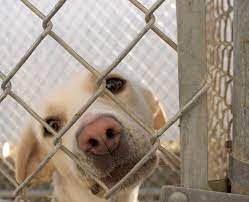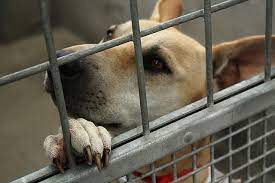The Compassion and Challenges of Adopting a Stray Dog
Stray dogs, those often-forgotten souls of our urban landscapes, deserve our respect and compassion. They are survivors of unfortunate circumstances, victims of abandonment, or lost souls struggling to find their way in a harsh and unpredictable world. In adopting a stray dog, we not only offer them a chance at a better life but also embark on a journey that comes with its unique set of challenges and rewards.
At the heart of this endeavor is the profound sense of respect and compassion that stray dogs deserve. Like all sentient beings, they yearn for kindness and humane treatment. They are not to be dismissed or disregarded; instead, they merit our empathy. These dogs find themselves in precarious situations through no fault of their own, and their presence on the streets underscores their resilience in the face of adversity.

One of the most heartwarming aspects of adopting a stray dog is the opportunity to offer them a loving home. While the path to such a union is paved with good intentions, it is essential to be cognizant of the potential challenges that come with it.
First and foremost are the health concerns. Stray dogs often endure harsh conditions that can lead to various health issues. Exposure to the elements, malnutrition, and a lack of veterinary care may result in ailments that require immediate attention. Thus, it is incumbent upon prospective owners to prioritize a thorough medical examination and provide any necessary treatment to nurse these dogs back to health.
Behavioral challenges also come into play. Stray dogs may have experienced trauma or neglect, which can manifest in behavioral difficulties. They may exhibit fearfulness, aggression, or an inability to adapt to a home environment. Addressing these challenges demands patience, understanding, and a commitment to training and socialization to help these dogs regain their trust in humans.


Building trust with a stray dog represents a journey that unfolds slowly, revealing itself as a testament to patience, understanding, and the remarkable resilience of these animals. Their history, marked by the uncertainty of life on the streets or perhaps even past neglect or mistreatment, makes them understandably cautious in their interactions with humans.
This caution is a survival instinct, a means of safeguarding themselves against potential harm. As such, when you first open your heart and home to a stray dog, you’re met with a creature who might initially be hesitant, wary, or even fearful. They may keep their distance, their eyes reflecting the uncertainties that have defined their existence thus far.
Yet, it’s precisely in this hesitancy that the potential for a profound and heartwarming bond lies. As you extend your hand in a gesture of goodwill, offering a safe space and gentle companionship, you embark on a shared journey of trust-building. It’s a journey characterized by small, incremental steps.
At first, trust may manifest as fleeting moments of connection. A tentative approach, a flicker of curiosity, or the softening of guarded eyes can be significant milestones. These small signs of progress can be incredibly rewarding, for they represent the gradual unfurling of a dog’s trust in you. As days turn into weeks and weeks into months, you’ll witness the transformation of a once-cautious creature into a devoted companion. The bond that develops is often deeper and more profound precisely because it’s hard-earned. It’s a testament to your patience and their resilience. It’s a testament to the healing power of love, care, and consistency. The trust that eventually blossoms between you and your stray dog is not merely transactional; it’s a genuine connection born of shared experiences and a growing sense of security. It’s in their wagging tail, their trusting gaze, and their willingness to seek solace in your presence that you’ll find the most heartwarming rewards of this journey.


In the end, the process of building trust with a stray dog teaches us not only about their remarkable capacity for forgiveness and resilience but also about the transformative power of empathy and patience. It’s a journey that exemplifies the beauty of second chances and the profound bonds that can form when compassion triumphs over adversity.
While adopting a stray dog certainly presents its share of challenges, it’s crucial to recognize that this endeavor contributes positively to the broader issue of stray dog populations. By offering a loving home and a second chance at life, we play a part in alleviating the plight of these forgotten souls.
Amid this heartwarming journey, adoption centers stand as invaluable allies. These shelters and organizations serve as beacons of hope, offering not only a refuge for stray dogs but also a wealth of support for prospective adopters. They provide a nurturing environment where stray dogs can begin the process of healing and socialization.
Benefits abound when you turn to adoption centers for assistance. They typically conduct thorough health assessments and provide necessary medical care for these animals. This ensures that when you bring a stray dog home, you do so with the peace of mind that their health needs have been addressed.
Furthermore, adoption centers often employ dedicated staff and volunteers who understand the intricacies of trust-building with stray dogs. Their expertise can be invaluable as you navigate the journey ahead, offering guidance on training, socialization, and addressing behavioral challenges.
In the intricate tapestry of adopting a stray dog, the qualities of loyalty, respect, and protectiveness are as diverse as the individuals themselves. These attributes are molded by a fusion of genetic predispositions, life experiences, and the nurturing care and training they receive post-adoption. It’s imperative to recognize that a dog’s behavior and temperament are multifaceted, influenced by both their genetic makeup and the unique path they’ve traversed. Loyalty, a trait cherished by dog owners worldwide, is not solely the domain of pedigree dogs. Stray dogs, too, have the capacity for profound loyalty once they’ve established trust and formed a bond with their human companions. This bond is often the result of a patient and persistent journey of trust-building, a testament to the resilience of these animals in overcoming their past hardships. Respect from a dog is often an embodiment of the relationship established between dog and owner. Dogs, as pack animals, instinctively respect those they perceive as leaders or caregivers. Earning a dog’s respect is a process that hinges on consistent, positive training, clear communication, and the setting of gentle yet firm boundaries. Harsh punishments should be avoided, as they can engender fear-based behaviors. Protectiveness is another aspect that can vary greatly among stray dogs. Whether a dog displays protective instincts hinges on their inherent temperament, breed characteristics, and individual experiences. Some dogs possess a natural protectiveness, while others are more easygoing. The key lies in guiding and molding these instincts through proper socialization and training to ensure they manifest in a positive and controlled manner. It’s essential to note that a dog’s behavior, whether they were once a stray or not, isn’t solely a reflection of their past. Any dog, regardless of their background, can exhibit dangerous behavior if subjected to mistreatment, abuse, or insufficient training and socialization. To mitigate such risks, a nurturing and loving environment should be provided, complemented by the patient addressing of any behavioral issues with the guidance of professionals when necessary. If concerns arise about a stray dog’s behavior or temperament, the assistance of a professional dog trainer or behaviorist can prove invaluable. These experts can offer insights into training, behavior modification, and safety protocols, ensuring that the bond between you and your canine companion thrives in harmony.
In essence, the adoption of a stray dog is a unique journey that holds the potential for profound loyalty, respect, and protectiveness. It underscores the remarkable adaptability and resilience of these animals, emphasizing that with care, training, and patience, a harmonious and loving companionship can emerge. The decision to adopt a stray dog is an act of compassion that should be undertaken with the utmost seriousness and responsibility. It is a journey that may be fraught with difficulties, but it is also one rich in rewards. These dogs, deserving of respect and empathy, have much to offer in terms of love, loyalty, and the profound sense of fulfillment that comes from knowing you’ve made a difference in the life of a once-forgotten soul.






